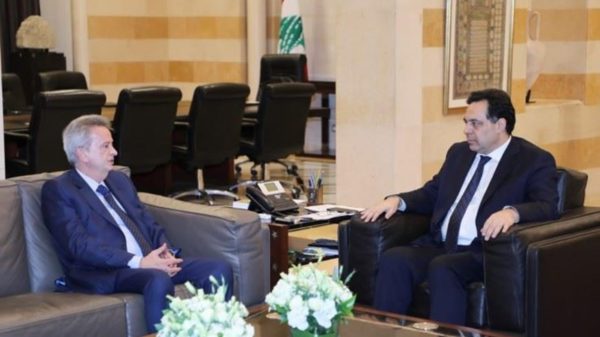The first round of talks between experts from the International Monetary Fund (IMF) and Lebanese officials has unveiled that the public dispute between Prime Minister Hassan Diab and Central Bank Governor Riad Salameh left a bad impression on the international organization, according to observers and businessmen.

The IMF has never witnessed similar divergences between the executive and monetary authorities throughout its cooperation with many countries.
“There are Lebanese qualitative gaps that would negatively affect talks with the qualified international team,” observers said.
Those gaps emanate from the dispute between Diab’s government and Salameh over a government reform plan, proposed two weeks ago to save the country from its grave financial and economic crisis.
During current talks with the IMF, Lebanon seeks $10 billion in loans, in addition to rapid aid of $900 million dollars, according to what Lebanese Finance Minister Ghazi Wazni told Asharq Al-Awsat this week.
The newspaper learned that IMF officials have expanded the specter of their contacts to include current and former Lebanese officials in crucial sectors such as the monetary authority, the banking sector, and some independent experts.
The IMF officials are particularly inquiring about the liberalization of the Lebanese lira exchange rate, in addition to the proposed mechanisms for the restructuring of the Central bank and the banking apparatus.
The financial institution is also testing the State’s seriousness in confronting smuggling via illegal crossings.
Observers noticed that the Lebanese team, headed by Wazni, was not equally convinced of the government’s economic plan.
Salameh announced he would not personally attend talks with the IMF, but delegated a team to represent him. Meanwhile, the Banking Association strongly rejected the government’s plan and said it was currently preparing an alternative, which it would send later to the IMF.
The observers also noticed a downsized representation of the banking sector during talks with the IMF.
They said the government’s attempts to contain the sector were materialized with recent official statements uncovering plans to decrease the number of commercial banks to around half.
Chairman of the Banking Control Commission of Lebanon (BCCL) Samir Hammoud, (whose legal term ended weeks ago) told Asharq Al-Awsat that Lebanon should have a national comprehensive vision to solve the current crisis, including a clear approach on the financial, economic, and banking situation.
“This plan should not seek to cut down from depositors’ accounts, but to work on the continuity of financing the debilitated economy,” Hammoud said.
Asharq Al-Awsat

Leave a Reply
You must be logged in to post a comment.